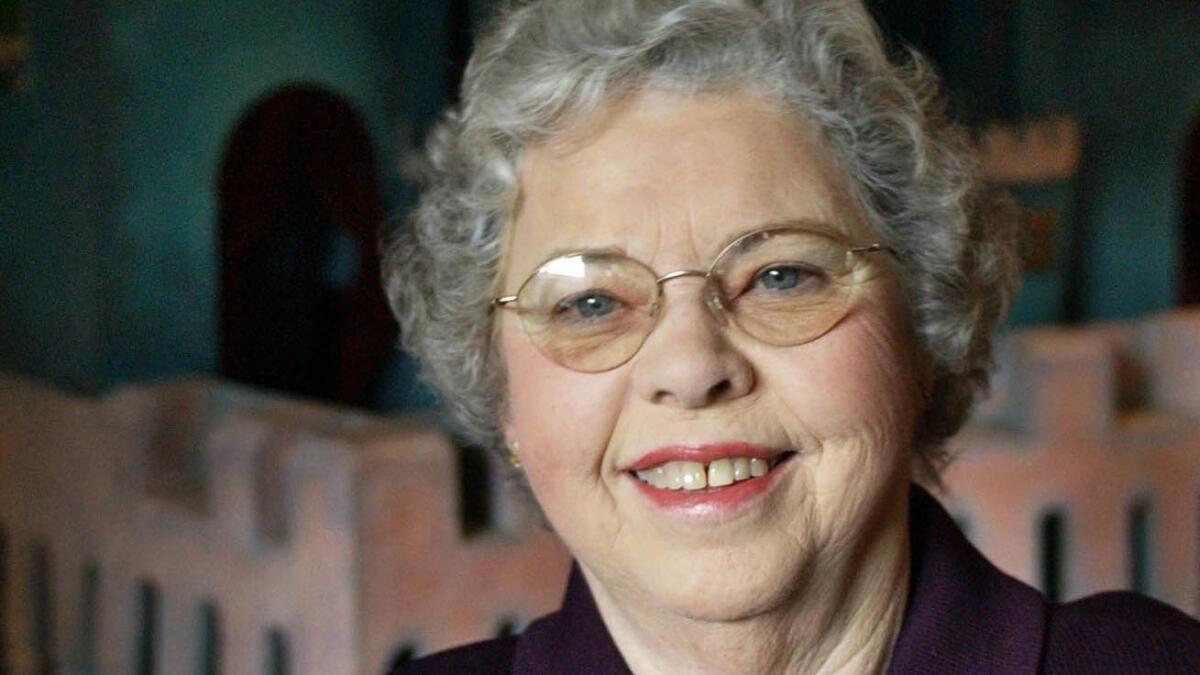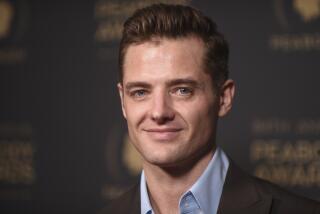Fred Rogers’ family keeps the legacy of ‘Mister Rogers’ Neighborhood’ alive with a candid new documentary
- Share via
In the 15 years since her husband’s death, Joanne Rogers has figured out a way to make do on her own.
For a good while, she continued to play music -- she was a professional concert duo-pianist -- but had to give it up when the arthritis in her hands “got mad.” But she still loves classical music, and relishes her visits to Pittsburgh Symphony Orchestra. And she reads a lot; her most recent favorite was Amor Towles’ novel “A Gentleman in Moscow.” (“It’s charming. You should Google that if you’re interested.”)
Of course, she still misses the man behind “Mister Rogers’ Neighborhood.”
“Part of me just went with him,” she says of her late spouse, Fred, to whom she was married for over 50 years until he died of stomach cancer in 2003. “But I find that he’s with me so much of the time. I can get to him very quickly.”
And Rogers, now 90, has done a lot of reflecting on her husband lately. She’s long helped to preserve his legacy, serving in leadership positions within his nonprofit organization, the Fred Rogers Company, and at the Fred M. Rogers Center for Early Learning and Children’s Media on the St. Vincent College campus.
But because 2018 marked the 50th anniversary of “Mister Rogers’ Neighborhood,” she’s frequently been called upon to speak about her spouse. There was a PBS special in March, a commemorative postage stamp and a new feature-length documentary, “Won’t You Be My Neighbor?” which debuted at this year’s Sundance Film Festival in January and opened to glowing reviews and strong box office receipts over the weekend.
The documentary, directed by Oscar winner Morgan Neville, is the only project ever to have heavily involved all of Rogers’ immediate family: Joanne, the couple’s two sons and Fred’s sister each participated in interviews. That’s largely due to the film’s producer, Nicholas Ma, who had a relationship with the Rogers thanks to his own famous father.

The trailer for the Mr. Rogers documentary “Won’t You Be My Neighbor.”
As a boy, Nicholas appeared twice on “Mister Rogers’ Neighborhood” alongside his dad, world-renowned cellist Yo-Yo Ma. The elder Ma maintained a close friendship with Fred Rogers, as the two grappled with how to live as public figures. Nicholas viewed the Rogers family as “those cousins you loved but didn’t get to see as much as you wanted.”
“Every time I talked to Joanne,” he recalled, “it was very clear that she was quite caught up on my life.”
Accordingly, when Neville began exploring the idea of a documentary on the cardigan-wearing television star, he asked Ma to reach out to the family matriarch to see if she’d be game.
“I couldn’t have been more sure of anybody than I would be of Nicholas,” Joanne remembered, calling from her home in Pittsburgh. “And it’s been a wonderful experience for me.”

Before she sat for two filmed interviews, she and Ma spoke monthly for over two years. They’d text a lot too.
“Oh, she’s an avid texter,” Ma said with a laugh. “Not only does she text, but she loves emojis. Especially the party hat one. Any time there’s good news about the film, she sends a heart emoji with an exclamation point. That’s kind of a great way to describe Joanne as a person: A heart with an exclamation point.”
Indeed, Rogers gives some of the most revealing anecdotes in the film. She notes that both she and her husband grew up in homes where they were unable to express their emotions, which is one of the reasons why as an adult, his most beloved puppet, Daniel the Tiger, served as a way for him to express his inner child.
“We never got mad at each other that much -- that we could express well,” she acknowledged. “We just got quiet. Both of us handled it that way, and that’s not the best way. It’s good to yell sometimes.”
“But Fred was a very sensitive person, and tears were available to him,” she continued. “I used to say, ‘You’re my liberated man, and I think it’s just wonderful.’”
The film also addresses longtime rumors that Fred was gay, with multiple friends close to him asserting he was, indeed, heterosexual. The whispers, of course, bothered Joanne, who described herself and her husband this way: “It was really a very, very good friendship. I’ve heard people say that men and women can’t be friends and lovers. We really were friends, and I know we were lovers.”
“I think Fred had that feminine sensibility,” she said. “All the men I’ve chosen to have as friends over the years seem to have that, and I think it’s a wonderful quality if you can find that in the person you’re going to live with.”
Confronting Fred Rogers’ public image was often a struggle for his family. As children, the couple’s two sons, John and Jim, would refer to the man they saw on television as “other daddy.” And when they got to middle school, the boys were teased about how moral their dad seemed.
“It was difficult,” John said in the film, “to have the second Christ as your dad.”
“Dad’s morals were just beyond most people,” he said, elaborating on that remark in a phone call from Nantucket, at the family home where he has summered since he was a boy. “The way he led his life, I believe dad tried to follow the example of Christ -- and did in such a fabulous way. So living up to a legend such as he was challenging for me growing up. I had my issues with that. But at about age 30, I sort of came to peace with it. I was like, ‘You know what? I’m happy with myself.’ And what did dad always teach us? ‘Be happy with the way you are.’”
But those growing pains weren’t always private.
In 1978, People magazine published an article about how a then-18-year-old Jim Rogers was rebelling against his family. “A freshman at his dad’s alma mater, Rollins College in Florida, Jim has stopped writing his folks or even returning their phone calls,” the article said. “‘He’s flown the coop,’ sighs his father. ‘It’s been a difficult year,’ agrees his mother. ‘There’s real hostility.’”
“Oh, I remember that article, and I wasn’t really thrilled with it,” Jim said, 40 years later. He now lives about 10 minutes from Joanne in Pittsburgh. “But dad always gave me room to grow. I’ve had a beard and long hair for a pretty long time, and he always thought of that as outside stuff that didn’t really matter. I can remember him saying one time he wished he could grow a beard so that people wouldn’t recognize him.”
As the child of a famous father, Ma said he sympathized with John and Jim, and used the commonality as a “jumping-off point” during interviews.
“The family’s willingness to participate is a gesture of great kindness,” the filmmaker said. “There’s not a lot of interviews you can find with them, and that’s not by accident.”
John, 56, said he’s enjoyed reflecting on his father’s legacy in recent months. He was particularly excited by the recent news that Tom Hanks was set to play his father in “You Are My Friend” — a biopic scheduled for release in October 2019 — because “dad watched ‘Forrest Gump’ probably a hundred times.”
“Dad tried to make people feel safe,” John said. “And that his work and what he tried to teach people have continued -- that would make him the happiest.”
“I think if dad were alive, he’d probably say, ‘What’s all this hoopla? This is silly,’” Jim added. “But at the same time, I think he’d probably lean back and reflect on a job well done.”
Follow me on Twitter @AmyKinLA
More to Read
Only good movies
Get the Indie Focus newsletter, Mark Olsen's weekly guide to the world of cinema.
You may occasionally receive promotional content from the Los Angeles Times.











